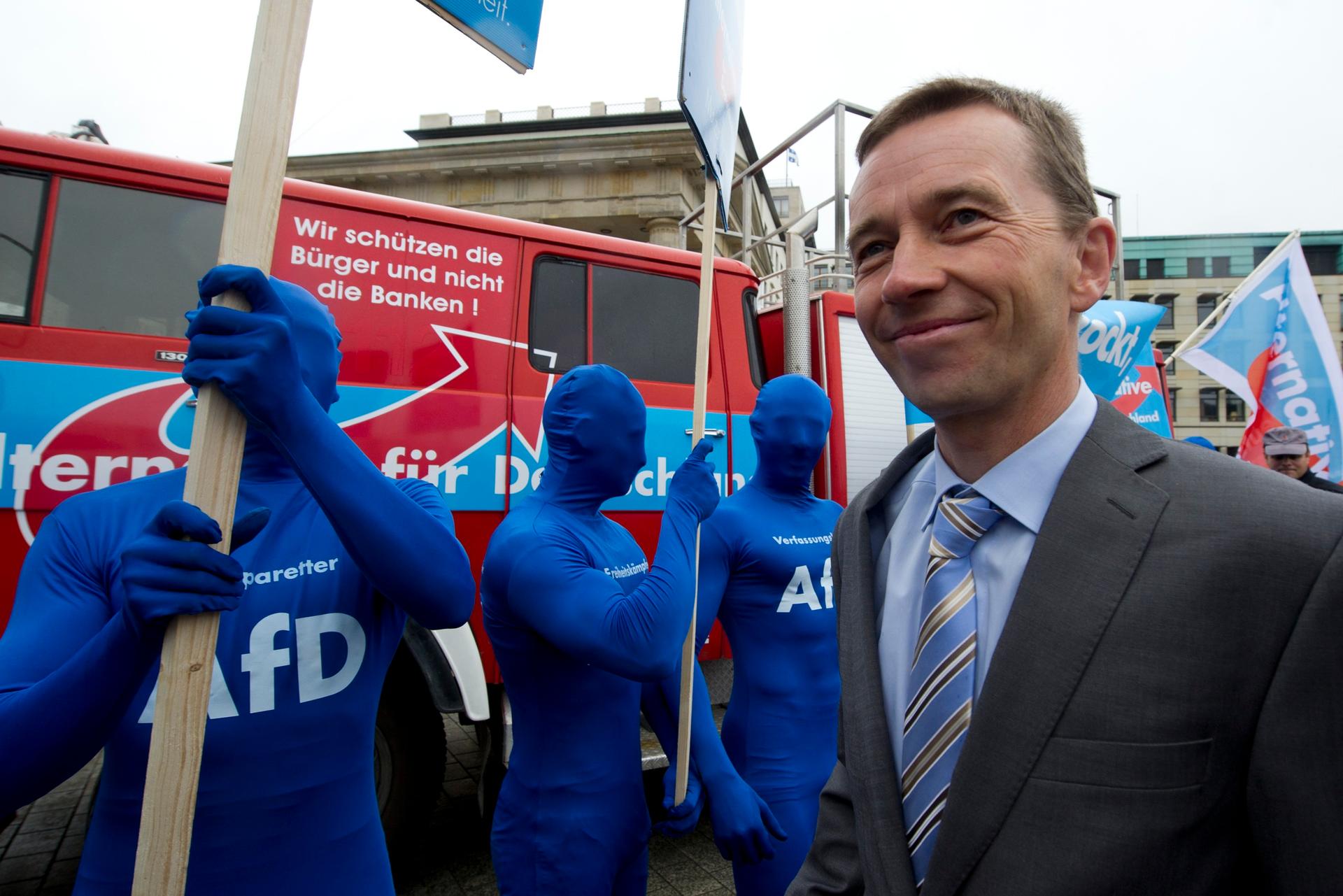Germany: Euroskeptics or neo-Nazis?
Lucky Lucke?
BERLIN, Germany — Bernd Lucke is a happy man. When he founded the anti-euro Alternative for Deutschland Party (AfD) six months ago, many dismissed him as the leader of a fringe group seeking to capitalize on a protest vote in national elections later this week.
Now, standing under the Brandenburg Gate under a light drizzle in front of several hundred supporters — mostly men with gray beards and spectacles — the economics professor said his party looks set to win at least 5 percent of the popular vote, the amount needed to qualify for seats in parliament when the country votes on Sunday.
“I am very confident about it, I think we are definitely in,” he said as members dressed as superheroes in blue lycra costumes set fire to a pile of fake euros.
Justified or not, the optimism was fuelled by the results of last weekend's regional polls in Bavaria, even though the AfD opted not to take part.
Chancellor Angela Merkel's junior coalition partner, the Free Democratic Party, the FDP, failed to win the mandatory 5 percent, while the anti-euro Free Voters party eclipsed the Greens — who are slipping in national surveys — by landing 9 percent.
For Lucke and his supporters, that's a sign his party's message resonates with ordinary Germans even though their country was spared serious trouble during the euro crisis and recently returned to economic growth.
The party advocates ending future bailouts for struggling euro zone members and encouraging them to leave. Instead of the current system, the party proposes a two-track Europe with parallel currencies that would reflect the popular German view that northern countries tend to be productive and southern ones lazy.
The Bavarian vote was telling for other reasons. Although Merkel’s CDU is expected to win the most votes in Sunday’s elections, the regional contest shone a spotlight on her greatest challenge: cobbling together a governing coalition after the results are in.
If the FDP fails to qualify for seats, she may have to approach the CDU’s main rival, the Social Democratic Party, to form a grand coalition.
Merkel’s critics on the right say groups such as the AfD have emerged precisely because she’s moved to the left, especially on social issues such as maternity support.
The AfD has grown to some 17,000 members from zero six months ago despite accusations that its conservative immigration policies have attracted infiltrators from Germany's extreme right. Many supporters switched from Merkel’s CDU.
Still, independent analysts rate AfD's chances as slim and question what influence it could have on Germany's euro policy if it does enter parliament.
Although polls indicate ordinary Germans don’t back the AfD’s position on kicking some countries out of the common currency or dumping it altogether, many agree with its less sweeping opinions about how to manage the euro crisis.
“The AfD's opposition to bailouts is widely shared among the German public,” says Nina Schick of Open Europe.
Lucke has had more trouble battling accusations that his erudite image obscures a far right, anti-immigrant agenda.
Der Spiegel recently drew attention to similarities between AfD’s immigration slogans and those of the extremist National Democratic Party.
Although the AfD says it vets would-be members for past association with extreme right parties, supporters at an early campaign rally newspaper distributed copies of the far right Junge Freiheit (Young Freedom), Reuters reported.
“Although the party leaders deny it, if you look at supporters, comments on its Facebook page, speakers at rallies and so forth, you can see the ugly face of nationalism, racism and anti-Semitism,” says Carsten Koschmieder, a researcher at Berlin's Free University.
More from GlobalPost: Has Germany’s Pirate Party already blown its shot at parliament?
Clearly seeking to address such opinions at the campaign rally on Monday, Lucke helped a multiethnic group of schoolchildren up a ladder to his platform on the back of a campaign truck. Anti-immigration? See the United Colors of Lucke.
Asked about his party’s future, Hugh Bronson, one of the AfD's Berlin candidates, said it’s not asking for anything more radical than an immigration policy that matches Canada's.
But once a new conservative party gets too loud to ignore, he added, the next step is to call them Nazis and hope the name sticks.
“In Germany, of course, that can be fatal.”
Every day, reporters and producers at The World are hard at work bringing you human-centered news from across the globe. But we can’t do it without you. We need your support to ensure we can continue this work for another year.
Make a gift today, and you’ll help us unlock a matching gift of $67,000!
